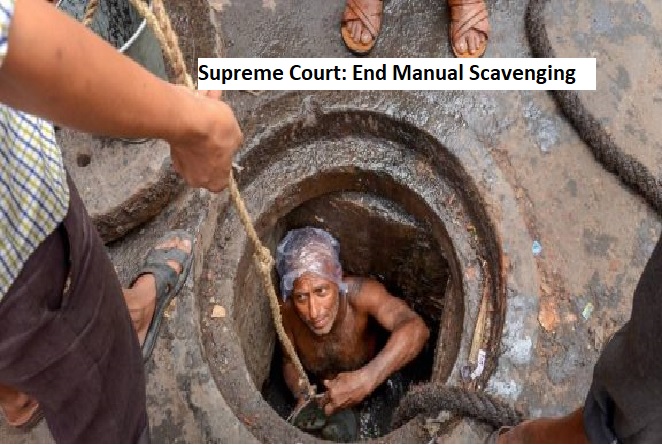


On October 20, the Supreme Court unequivocally instructed the Union and State Governments to eliminate manual scavenging entirely.
The Supreme Court, deeply concerned about the persisting manual scavenging, mandated a raise in sewer death compensation to 30 lakhs. For permanent disablement from sewer work, the compensation is increased to 20 lakhs, and for other disablements, it should not be less than 10 lakhs.
Justices S. Ravindra Bhat and Aravind Kumar's bench issued 14 directives to the Union and State Governments, focusing on enforcing the Prohibition of Employment as Manual Scavengers and their Rehabilitation Act 2013 effectively. Additionally, the court ordered measures for the victims and their families' rehabilitation, including scholarships and skill development programs.
Justices S. Ravindra Bhat and Aravind Kumar's bench issued 14 directives to the Union and State Governments for the efficient enforcement of the 2013 Prohibition of Employment as Manual Scavengers and their Rehabilitation Act. The court also ordered proactive steps for rehabilitating the victims and their families, including provisions for scholarships and skill development programs.
The bench delivered its verdict in the Dr. Balram Singh v. Union of India case, a Public Interest Litigation filed against the employment of manual scavengers.
Justice Bhat referenced Dr. Ambedkar's words during the judgment, stating, "Our fight is not for wealth or power; it's a battle for freedom and the restoration of human dignity."
To achieve true equality as envisioned by the Constitution, the commitment made by its framers, with provisions like Articles 15(2), 17, and 23 and 24, must be upheld. The Union and States bear the responsibility of eradicating manual scavenging. We owe this to a marginalized population who have endured invisibility, silence, and inhumane conditions. The Constitution and the 2013 Act place clear obligations on the Union and States to fully implement these provisions in both word and intent.
The directives are as follows:
1. We, as citizens, have a collective duty to achieve genuine fraternity. Our Constitution places significant importance on dignity and fraternity, as without these, all other freedoms are mere illusions. It is our responsibility to wake up and work towards dispelling the darkness that has plagued generations, ensuring they experience the freedoms and social, economic, and political justice that we often take for granted in our republic's achievements.
2. All States and Union Territories must ensure that guidelines and directives established by the Union are incorporated into their respective guidelines and directions. States must particularly ensure that these directives apply to all municipalities and local bodies operating within their jurisdictions.
3. The Union, States, and Union Territories are instructed to guarantee comprehensive rehabilitation, encompassing employment opportunities for the next of kin, education for the dependents, and skill training for sewage workers and those who lose their lives in such work.
4. The court orders the Union and the States to ensure an increase in compensation for sewer deaths, considering that the previous fixed amount, i.e., 10 lakhs, was set in 1993. The current equivalent of this amount is Rs. 30 lakhs. This is the new standard compensation to be provided by the relevant agency, whether it's the Union, Union Territory, or State, as applicable. In other words, compensation for sewer deaths will now be 30 lakhs. If the dependents of any victim have not received this amount, they are entitled to it. This will be the new and ongoing compensation amount.
5. Similarly, for sewer victims with disabilities, compensation will be granted based on the extent of their disability. However, the minimum compensation will not be less than 10 lakhs. In the case of a permanent disability that leaves the victim economically disadvantaged, the compensation will not be less than 20 lakhs.
6. The relevant government entity (i.e., the Union, State, or Union Territories) must establish an effective mechanism to enforce accountability, especially in situations where sewer deaths occur during contractual or outsourced work. This accountability may involve immediate contract cancellation and the imposition of financial penalties, intended to discourage such practices.
TAGS: Compensation for Sewer Deaths Rehabilitation Measures Accountability for Sewer Deaths Contractual Work Monetary Liability Deterring the Practice.